
A list of 53 applicants vying to become Chicago’s next top cop has been whittled down to six candidates, including five department veterans and an outsider who previously worked for the Civilian Office of Police Accountability, the Sun-Times has learned.
Advancing to the background check phase of the nationwide search are: Counterterrorism Chief Larry Snelling; his now-retired predecessor, Ernest Cato III; Street Deputy Migdalia Bulnes; Constitutional Policing and Reform Chief Angel Novalez; Labor Relations Cmdr. Donna Rowling; and Shon Barnes, the police chief in Madison, Wisconsin, who spent about a year as COPA’s director of training and development.
Snelling, Cato and Barnes are Black. Novalez and Bulnes are Hispanic. Rowling is white. And both Rowling and Bulnes are women.
The Community Commission for Public Safety and Accountability, a new civilian oversight body charged with leading the first of its kind search, faces a July 14 deadline to pick three finalists and deliver those names to Mayor Brandon Johnson.
Johnson wants a permanent superintendent from within the current ranks of the Chicago Police Department, or someone with CPD experience. He views an insider as key to boosting rank-and-file morale that hit rock bottom under former Supt. David Brown, the former Dallas police chief who resigned the day after then-Mayor Lori Lightfoot lost her bid for a second term.
But sources say Johnson is equally determined to leave Interim Supt. Fred Waller at the helm through the summer, when violent crime traditionally surges.
After Johnson gets the three final names, he has 30 days to make his pick for a job that’s among the most important a Chicago mayor must fill.
Once Johnson decides, the City Council has 60 days to confirm his choice. During that time, the designee would appear at public meetings in neighborhoods across the city, the ordinance states.
If the civilian panel doesn’t deliver the names until July 14, Waller could remain in place through summer, as Johnson wants.
That is, unless Johnson rejects the three finalists and orders the commission to conduct a second nationwide search. That’s unlikely, considering the controversy that occurred after then-Mayor Rahm Emanuel did just that.
In the furor after the court-ordered release of the Laquan McDonald shooting video, Emanuel discarded the three finalists put forth by the Lightfoot-run Police Board and dipped down into the ranks for Chief of Patrol Eddie Johnson, who had not even applied for the job.
Lightfoot ultimately fired Johnson after he was found asleep at the wheel of his running police SUV following a night of drinking with a female underling with whom he was having an extramarital affair. At the time, Lightfoot accused him of “lying to me and lying to the public” about the circumstances surrounding the drunken driving incident.
The commission leading the current search has closely guarded semifinalists’ names — to ensure its independence and avoid political influence.
Nonetheless, the Sun-Times has identified those making the cut.
Ernest Cato III
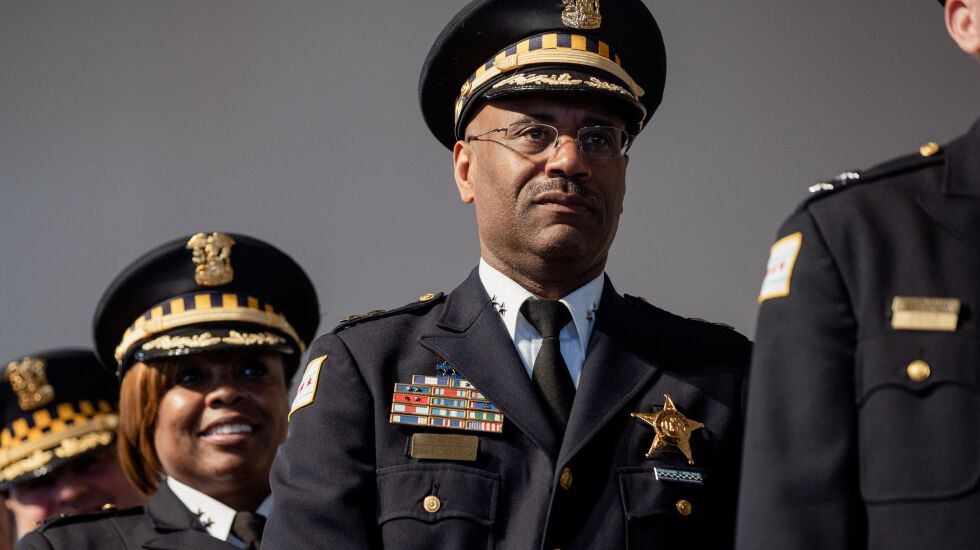
Cato abruptly resigned last September after a 32-year career. He started as a patrolman in the now-defunct Prairie District on the South Side.
He built his reputation as a lieutenant and later as a commander in the West Side’s historically violent Austin District, where Mayor Johnson lives with his wife and three children. Cato was named deputy chief of Area 4 before being tapped for the top job in the counterterrorism bureau, which conducts gang and narcotics investigations.
In 2020, Cato was a finalist in the search leading to Lightfoot’s selection of Brown.
Lightfoot stuck by Brown even as violent crime spiked and every other mayoral candidate vowed to fire him.
Cato’s chances in the current search may suffer from a lawsuit filed this week by the ACLU of Illinois accusing him of pushing his subordinates in Area 4 to make more traffic stops as a crime-fighting strategy.
Those same types of stops have disproportionately targeted people of color and rarely lead to arrests, according to the ACLU.
A petition endorsing Cato drew more than 700 signatures and he was briefly scheduled to meet with supporters before the online event was called off.
At the time, Commission President Anthony Driver criticized such public campaigning, insisting the process was “not a popularity contest.” Despite that perception, Cato made the cut.
Larry Snelling
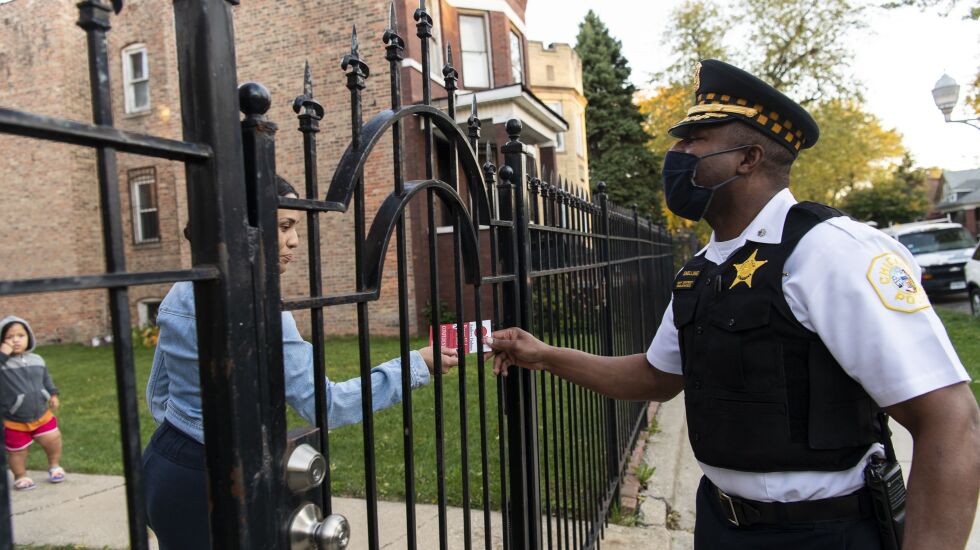
After Cato, Larry Snelling took over as counterterrorism chief. Until then, the well-regarded supervisor was deputy chief of Area 2.
Over more than three decades with CPD, he has also served as commander of the Englewood District and as a sergeant for recruit training at the police academy.
He notably designed the latest version of CPD’s use-of-force training model and was a lead trainer ahead of the 2012 NATO Summit, when the department was praised for a largely nonconfrontational approach that defused a potentially volatile interaction with protesters near McCormick Place.
Snelling’s background shows deep expertise in constitutional policing as he moves closer to potentially lead a department struggling to implement sweeping court-ordered reforms.
However, he has also been suspended at least twice over his long career.
A database compiled by the Invisible Institute shows a use-of-force complaint against Snelling in 1994 triggered a two-day suspension. The following year, he served a five-day suspension for another complaint alleging conduct unbecoming. Details of both incidents weren’t immediately known.
Migdalia Bulnes
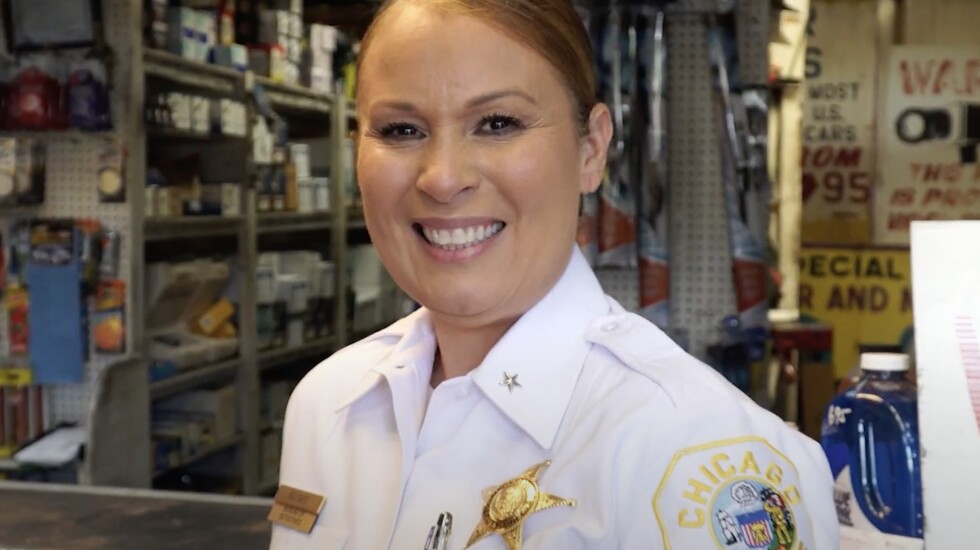
Raised in Humboldt Park and Logan Square, Bulnes joined the police department in 1998 and has held a range of jobs, including as an undercover narcotics officer.
As a street deputy, she’s now charged with responding to high-profile events across Chicago, including police shootings and SWAT incidents. Prior to that, she was commander of the South Chicago District and later deputy chief of the Bureau of Detectives.
Last year, she was one of three finalists to become Evanston’s next police chief.
During a forum with the other Evanston finalists, Bulnes expressed concern about a shortage of police officers in the northern suburb. An even bigger shortage now plagues Chicago. An avalanche of retirements has left CPD with 1,700 fewer officers than when Lightfoot took office in 2019.
Bulnes vowed to make recruitment her “number one priority” in Evanston. “If you staff your department and you train them,” she said, “that is the actual source you’re going to need to bridge the community with the police.”
She ultimately lost out to Schenita Stewart, a former deputy police chief in East Dundee.
Three years ago, then-Inspector General Joe Ferguson released a scathing audit concluding that a $4.8 million-a-year CPD program intended to divert young people from the criminal justice system may have done the opposite. At a hearing, Bulnes assured alderpersons the department was making changes in the Juvenile Intervention Support Center, located in a converted police station in Brighton Park.
She said detectives were being trained to “become more trauma-informed” and that the University of Chicago Crime Lab would improve record keeping. She also said a field response team was being formed to remedy the fact that few of the young people processed by police completed the anger management, substance abuse and family counseling services recommended for them.
“We have changed the look of the JISC, given it a softer feel with hand-painted murals and new furniture,” she said. “CPD wants the JISC to feel less like a police station and more like a place where children can come to change their lives.”
Angel Novalez
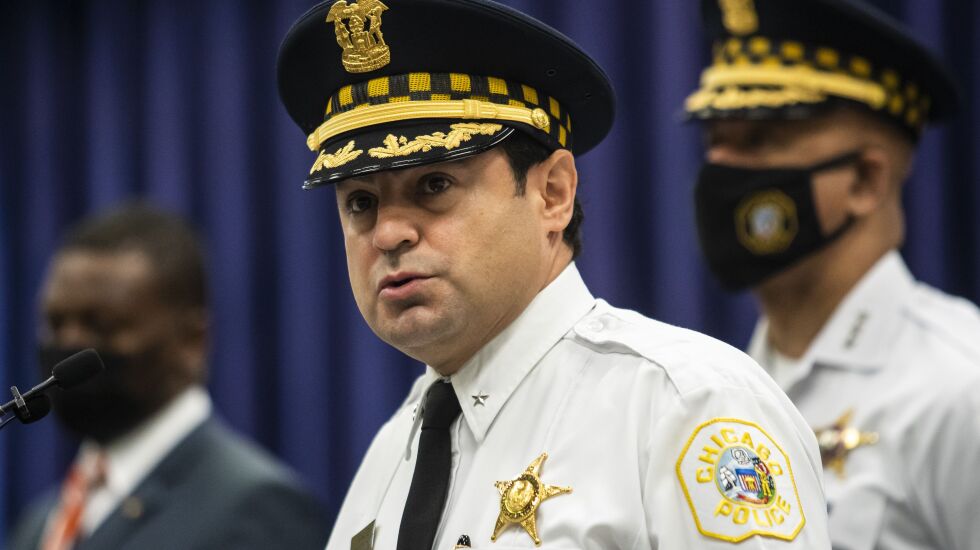
For a department working to make court-mandated changes, Novalez holds a crucial role as chief of the Office of Constitutional Policing and Reform. He’s tasked with creating and implementing policies to meet the demands of a federal consent decree put in place in response to the police killing of Laquan McDonald.
Before that, he was deputy chief of the Office of Community Policing, overseeing the expansion of the department’s Civil Rights Unit and Neighborhood Policing Initiative Programs. He was placed in charge of community policing two weeks after civil unrest triggered by the murder of George Floyd.
Two years ago, a program encouraging district coordination officers to personally engage with residents expanded from seven to 10 districts, adding Grand Crossing, Englewood and Gresham.
“We want some participation from the community because that will help us build some accountability. Also, it gives people a sense of ownership of their own geography,” Novalez told reporters while discussing the expansion.
Nevertheless, a report released last month by Northwestern University researchers concluded the nearly-four-year-old Neighborhood Policing Initiative has fallen short of its goal of strengthening CPD’s relationship with the community and reducing crime.
In July 2022, Novalez testified before the U.S. Senate Judiciary Committee about how gun violence impacts Chicago police officers. He recalled being shot in the line of duty earlier in his career, noting his injuries “remain with me today professionally, physically and in the private corners of my mind.”
Donna Rowling
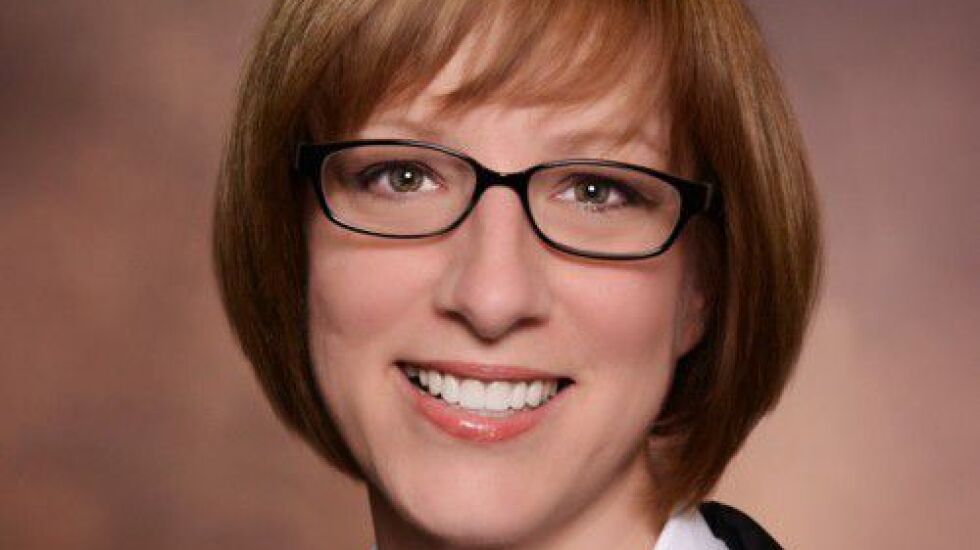
Rowling was named commander of the department’s Labor Relations Division in 2020, putting the licensed attorney in charge of overseeing contractual agreements with the city’s police unions and fielding complaints from members.
That has been a formidable task under the outspoken leadership of Fraternal Order of Police President John Catanzara — who, among other things, compared Lightfoot’s since-overturned mandatory vaccination policy to the dictates of Nazi Germany. More recently, Catanzara filed a complaint with Rowling’s office over the city’s decision to have newly arrived migrants sleep shelter in police station lobbies.
Rowling joined CPD as an officer in 1993 and has since worked as a lieutenant in the Gresham District and as a sergeant in both Management and Labor Affairs and CompStat. That section uses data on crimes, arrests and other police activity to hold top brass accountable for their performance.
Shon Barnes
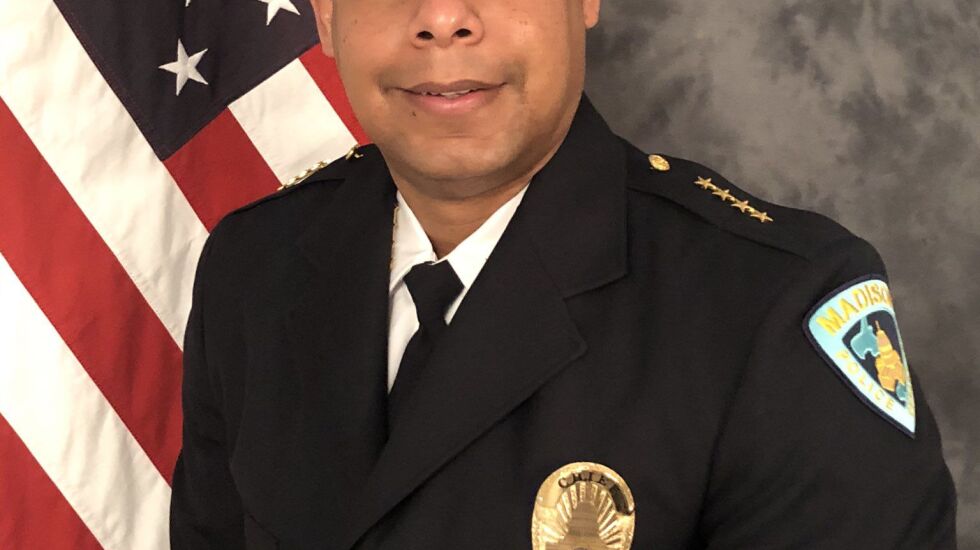
Barnes is the only outsider among the semifinalists, though he has a clear connection to law enforcement in Chicago.
Before being hired in 2021 as police chief in Madison, Wisconsin, a college town with a population of less than 270,000 people, he was director of training and development at COPA. That agency, charged with investigating serious misconduct allegations, is widely derided by rank-and-file officers.
Barnes earned his police stripes as deputy chief in Salisbury, North Carolina, after 17 years on the force in nearby Greensboro, where he reached the rank of captain.
In Madison, he was accused of making sexually inappropriate comments to one of his officers. The woman claimed that during her exit interview, Barnes inquired about her sexual orientation and asked whether she would continue working for the department if she found love, and if he could assist her.
He was cleared of any wrongdoing after a thorough investigation. The department concluded there was no evidence he violated the city’s policy against sexual harassment and discrimination.
The Madison mayor’s chief of staff subsequently apologized for the fact that “city staff inadvertently confirmed details about the complaint, which was harmful to both parties.” Barnes accepted the apology.
He said his role as police chief was “inherently professional and personal” and that he uses exit interviews to “explore the well-being of my employees as well as their future aspirations.” He said he seeks to understand “what the agency can learn from their departure.”
During his brief stint at COPA, Barnes served under chief administrator Sydney Roberts. She was forced out in May 2021 after Lightfoot publicly ridiculed the slow pace of COPA investigations.
‘That is the Chicago way’
Throughout the search, the Community Commission on Public Safety and Accountability has gone out of its way to seek input from both Chicago residents and rank-and-file police officers. Numerous public hearings have been held in neighborhoods across the city, with Chicagoans expressing their strong desire for an insider.
But the process has not been without controversy.
Just last week, 19 City Council members wrote a letter Johnson questioning the validity and fairness of the search process after Chief of Patrol Brian McDermott was denied an in-person interview after a telephone screening.
Driver called the apparent aldermanic interference “completely inappropriate.”
“It’s frustrating, but it’s not unexpected,’ he said. “That is the Chicago way, and that’s exactly why our commission was created — and to rid ourselves of that.”







